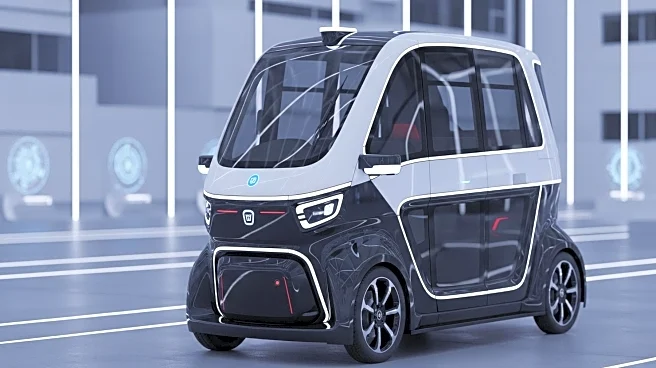What's Happening?
Omega Seiki Mobility, an Indian electric vehicle manufacturer, has introduced the world's first commercially available autonomous electric three-wheeler named Swayamgati. Priced at Rs 4 lakh for the passenger variant, the vehicle is designed for short-distance transport in controlled environments such as airports, technology parks, and smart cities. Equipped with an AI-based autonomy stack, including Lidar and GPS, Swayamgati can detect obstacles within six meters and offers a driving range of up to 120 km per charge. The company plans to roll out 1,500 units within the next 24 months, following a successful pilot phase where the vehicle completed a 3-km route with seven stops without human intervention.
Why It's Important?
The launch of Swayamgati marks a significant step towards self-reliance in India's transportation sector, showcasing the country's capability in developing advanced autonomous technology. This innovation is particularly relevant amidst global geopolitical turbulence, as highlighted by Indian officials emphasizing self-reliance. The vehicle's affordability and zero emissions make it accessible to businesses in Tier 2 and Tier 3 locations, potentially transforming urban mobility and reducing environmental impact. The initiative aligns with India's broader focus on indigenization and technological advancement, contributing to economic growth and sustainability.
What's Next?
Omega Seiki Mobility aims to expand the deployment of Swayamgati across various controlled environments, enhancing urban mobility solutions. The company plans to introduce a cargo version soon, priced at Rs 4.15 lakh, further diversifying its offerings. As the rollout progresses, stakeholders such as technology parks and smart cities may adopt these autonomous vehicles, potentially influencing public policy and infrastructure development. The success of Swayamgati could encourage other manufacturers to invest in autonomous technology, fostering innovation and competition in the EV market.
Beyond the Headlines
The introduction of autonomous vehicles like Swayamgati raises ethical and legal considerations regarding safety standards and regulatory frameworks. As these vehicles become more prevalent, discussions around liability in case of accidents and the integration of AI in public transport systems will become increasingly important. Additionally, the cultural shift towards accepting autonomous technology in everyday life may influence consumer behavior and societal norms, paving the way for broader acceptance of AI-driven solutions.









